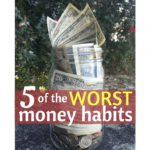5 of the Worst Money Habits
This post may contain affiliate links, meaning that I may earn a small commission if you make a purchase. See our disclosure policy for more information.
Would you go back in time were it possible? I totally would! First I’d hit early 1800s England, then 1890s in the Wild West (but only for a day or two cause that would be intense) and then I’d hit the year 2000 in Wichita, KS. HA!
If I could go back, I’d give my 18 year-old-holier-than-thou-self a wake up call. Shake her up a little, tell her that if she starts certain money habits (and stops others), that she’ll be sitting pretty when she gets out of college. Oh, who am I kidding, I probably wouldn’t have listened anyway. I was stubborn like that, and truth be told, I still am. I’m just a smarter stubborn now.
I didn’t learn how to effectively manage my finances until I was well into my twenties – creepin’ up on 30. Money habits are some of the hardest to break. For me, it took breaking these money habits to pull myself out of debt and onto a path of financial freedom. Sounds cheesy, but it is true.

5 of the Worst Money Habits
1. Buying things you don’t need.
There is a reason I put this as number one. Instant gratification is a driving force behind much of the debt in today’s society. Not only is instant gratification an issue, but we tend to toss things way too early; things that we could get much more use out of. Sometimes I find things in my own trash bin that I know could be reused or re-purposed.
#thestruggleisreal
2. Not having a budget.
The number one budget killer: Not having a budget in the first place. If you don’t want to build a budget (I get you) you should in the very least know how much you have coming in every month and what you have going out every month.
You know what though? Budgets really are a necessary evil. Whether you are creating a budget to get out of debt, or to build a savings account, or if you’re saving up for a car or a down payment on a home; effective budgeting is the quickest way to reach your goal. Budgeting gives you more control over your finances. It may feel restrictive at first, but the outcome far outweighs the struggle in the beginning.
3. Thinking negative thoughts.
Wanna save this for later?
What does this have to do with money, you ask? Surrounding yourself with negative people or negative thoughts only perpetuates negativity. This (for me at least) fuels a desire to self medicate by shopping or satisfying some perceived “need” that simply is unattainable. By staying positive, and surrounding myself with positive, upbeat people, I find that I am fulfilled without making that trip to Target or to Kohl’s.
4. Only paying the minimum balance.
Does your credit card company include minimum balance payment – payoff dates and numbers for you? Mine does, although I pay the entire statement balance every month. Let’s say you have a $5,000 balance on your credit card and that your minimum payment is 4% of that balance. If you paid just the minimum payment every month (without charging ANYTHING new) you are paying an additional $1800ish over the next 10 years (depending on your interest rate, of course).
That is ten loooong years, and the interest alone is over one third of the amount you charged in the first place! By paying more than minimum balance (even jut a little bit), you’ll get it paid off faster, you’ll free up that cash flow to use in other areas of your budget, or to work less and travel more. I like to travel.
5. Not having an emergency fund.
Not having an emergency fund only causes you to go into debt when you do have an emergency. If you don’t have an emergency fund yet, start building that puppy yesterday. A little here, a little there, throw whatever you can at that bad boy until you get a decent cushion built up.
How much is enough?
Well, that’s up to you. We have three different savings accounts: one for emergency fund, one for savings and a secret savings; where I can go get a pedicure without feeling guilty. For us, $1,000 is a good number because if the tires need replaced or if we need to call a repair man, the cost hopefully won’t exceed that $1,000. When we need to use that emergency fund it is there, and we can build it back up again as needed.
Case in point: our soon-to-be ten year old son is having an MRI of his brain next week in preparation for a cardiac neuro-psychology appointment at the end of the month. The co-pay is due up front and is $400. We’ll use the emergency fund for that, and build it back up to $1,000 as quickly as possible.
More finance? Sure thing!
Tips for Choosing Credit Cards (for Their Rewards Programs)
Budget 101: How to Manage Your Budget Like an Adult
Better Budget: How to Live On ONE Income, Tips and Budget Ideas
11 Tips for Staying out of Debt at Christmas Time
9 Tips to Becoming Debt Free
Boosting Your Credit Score – Keep your Debt to Available Credit Ratio Low + Oldest Cards Remain OPEN!







